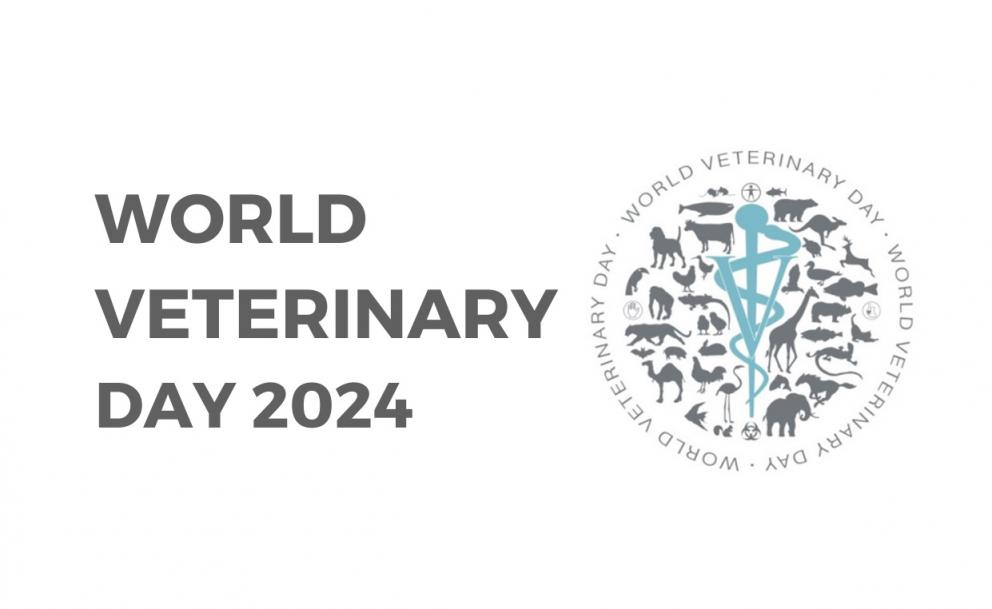You are here
The Essential Role of Veterinary Teams in Animal Health - World Veterinary Day 2024

The theme for World Veterinary Day 2024 is “Veterinarians are essential health workers”.
As we commemorate this global event, we want to recognize and highlight the role of veterinary teams in maintaining the health of pets, horses, and livestock. These dedicated teams, composed of veterinarians, veterinary technologists, assistants, and other support staff, work collaboratively to provide comprehensive care that is vital to the well-being of animals and, by extension, to public health and food security.
Below we explore just some of the roles and responsibilities of veterinary teams, and the impact they have on animal and human health.
Pet Health
Pets are an integral part of many families, providing companionship and emotional support. Veterinary teams are at the forefront of ensuring that these beloved family members receive the care they need to live healthy, happy lives. From routine check-ups and vaccinations to emergency surgeries and chronic disease management, veterinary professionals work tirelessly to maintain the health of pets.
Veterinary teams also contribute to public health by helping to control zoonotic diseases—illnesses that can be transmitted from animals to humans. By maintaining vaccination regimens and dispensing parasite control medication/advice, veterinary teams help prevent the spread of diseases such as rabies and lyme disease, which can have serious implications for human health.
Equine Health
Equine veterinarians specialize in the health and well-being of horses, which requires a unique set of skills and knowledge. These professionals are responsible for a wide range of services, including preventive care, dental work, vaccination, reproductive services, and emergency response. Equine veterinary teams often work on-site at stables and farms, providing care that is tailored to the specific needs of each horse.
Livestock
Large animal and livestock veterinarians play a critical role in the health of livestock and, consequently, in Canadian (and global) food security. These professionals work to ensure that animals raised for food production are healthy, which directly impacts the safety and quality of the food supply. Veterinary teams are involved in disease prevention, diagnosis, emergency planning, and treatment, as well as in the management of herd health programs.
Veterinary teams contribute to food safety by addressing zoonotic diseases and foodborne illnesses, implementing biosecurity measures to prevent the spread of infectious diseases within and between farms. They are also involved in surveillance and control efforts to detect and respond to disease outbreaks. Rural and livestock veterinary teams are essential in maintaining the health and productivity of livestock, which in-turn supports the livelihoods of farmers and contributes to economic stability.
Wildlife and Ecosystem
Wildlife rehabilitation centers across Canada provide specialized medical care for sick, injured, or orphaned wild animals. These centers are staffed by trained professionals, including veterinarians, who work together to ensure the best possible outcomes for the animals.
As we continue to face the challenges of habitat destruction, overexploitation, and pollution, the role of veterinarians in wildlife conservation becomes increasingly important.
Other Sectors
In addition to their pivotal role in clinical settings, veterinary teams and professionals extend their expertise across various sectors:
Government: Veterinary professionals in government play a vital role in protecting public health. They help develop policies and regulations to control disease outbreaks, monitor the health of livestock and poultry, and implement biosecurity measures to prevent the spread of zoonotic diseases. Veterinarians who work with and within government also work closely with public health agencies to investigate and respond to foodborne illnesses, ensuring that the food supply is safe for consumption.
Academia: Veterinary professionals in academia contribute to the education of future generations of veterinarians and conduct essential research that advances both animal and human health. They develop and teach curricula that prepare students for careers in various fields, including companion animal practice, food animal medicine, and public health. Academics also engage in research projects that address pressing issues in animal health, such as the development of new vaccines, the identification of emerging diseases, and the improvement of animal welfare standards.
Research: Veterinarians in the research sector are at the forefront of biomedical studies, including medical research and the development of therapies for diseases affecting both animals and humans. They collaborate with researchers from various disciplines to conduct studies that improve our understanding of disease processes, test new treatments, and develop diagnostic tools.
Industry: Veterinary professionals working in industrial settings contribute to the development and safety of animal-related products, including pharmaceuticals, vaccines, pet foods, and other products. They work with manufacturers to ensure that these products meet the highest standards of quality and safety, conducting clinical trials, monitoring adverse events, and providing expert advice on product development. Veterinarians in industry also contribute to the development of new technologies, such as diagnostic tools and animal identification systems, which improve the efficiency and effectiveness of animal health management.
Learn More
To get a broader perspective on the invaluable work veterinary teams perform, explore the Alberta Animal Health Source and visit the World Veterinary Day official website to learn more about the world of animal health and care.
